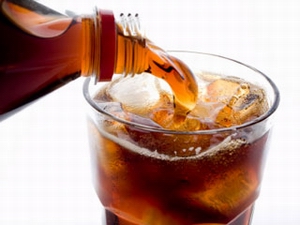 estricting the sale of large sodas and other sugar-sweetened beverages in restaurants and other food-service outlets would affect 7.5 percent of Americans each day and have the greatest impact on overweight people, according to a new study.
estricting the sale of large sodas and other sugar-sweetened beverages in restaurants and other food-service outlets would affect 7.5 percent of Americans each day and have the greatest impact on overweight people, according to a new study.In an effort to fight obesity, New York City's Board of Health approved a ban on the sale of sugary beverages larger than 16 ounces at eateries, but the law was struck down by the New York state Supreme Court in March. An appeal began this week.
In order to assess the effect that such a ban would have nationwide, researchers at Columbia University's Mailman School of Public Health analyzed the records of more than 19,000 people who took part in the U.S. National Health and Nutrition Examination Survey from 2007 to 2010.
The study found that about 60 percent of Americans consumed sugary drinks daily, but only 7.5 percent of them purchased "super-size" sugary drinks from an eatery on a given day. The rates, however, were somewhat higher for certain groups: 13.6 percent of overweight teens, 12.6 percent of overweight young adults aged 20 to 44 and 8.6 percent of overweight people in general.
The investigators also found that low-income and high-income people were equally likely to buy large sugary drinks from restaurants, which challenges the criticism that a ban on the sale of these drinks at eateries discriminates against the poor.
The researchers said this finding was a surprise because poorer people are more likely to drink sugary beverages than those with higher incomes. But although poor people tend to consume more sugary beverages, it's cheaper for them to buy these drinks at a store and consume them at home, the authors said.
The study, published online in the American Journal of Clinical Nutrition, used national data but shows that this type of ban would help fight obesity no matter where in the country it was implemented.
"Our findings are clear: A law like this would address one of the fundamental causes of obesity -- the growing portion size of sweetened drinks," lead author Dr. Y. Claire Wang, an assistant professor of health policy and management, said in a university news release.
For example, the study authors said, in 1955, a regular-size soda at McDonald's was 7 ounces. The sizes offered today range from a 12-ounce child-size drink to a 32-ounce drink. "Changing social norms is difficult, but as portion sizes have grown, it's useful to establish a new standard," Wang said.
Another expert, Dr. Sandro Galea, chairman of the department of epidemiology at the Mailman School, pointed out the importance of the study findings.
"[The study] provides critical foundational evidence that the proposed efforts to restrict marketing of large sodas in New York City and elsewhere can have a substantial impact on population health," said Galea, who is also a member of the New York City Board of Health.
Commenting on the study findings, Christopher Gindlesperger, senior director of public affairs at the American Beverage Association, stated that "it's time for a comprehensive approach to addressing obesity."
Gindlesperger pointed out that "obesity is a complex issue with many contributing factors beyond one type of food or beverage. A recent report found that in 2010, U.S. youth consumed 68 fewer calories and adults 45 fewer calories per day from added sugar in soft drinks than in 2000, yet obesity rates continue to rise."





